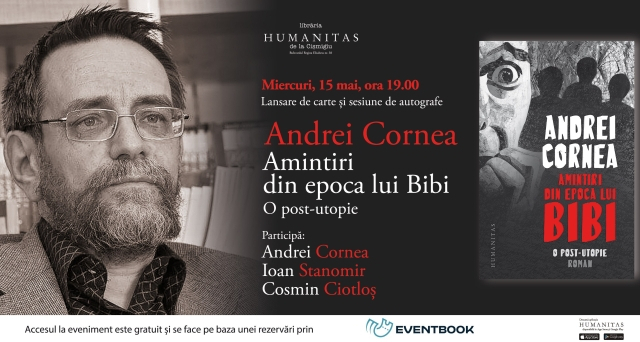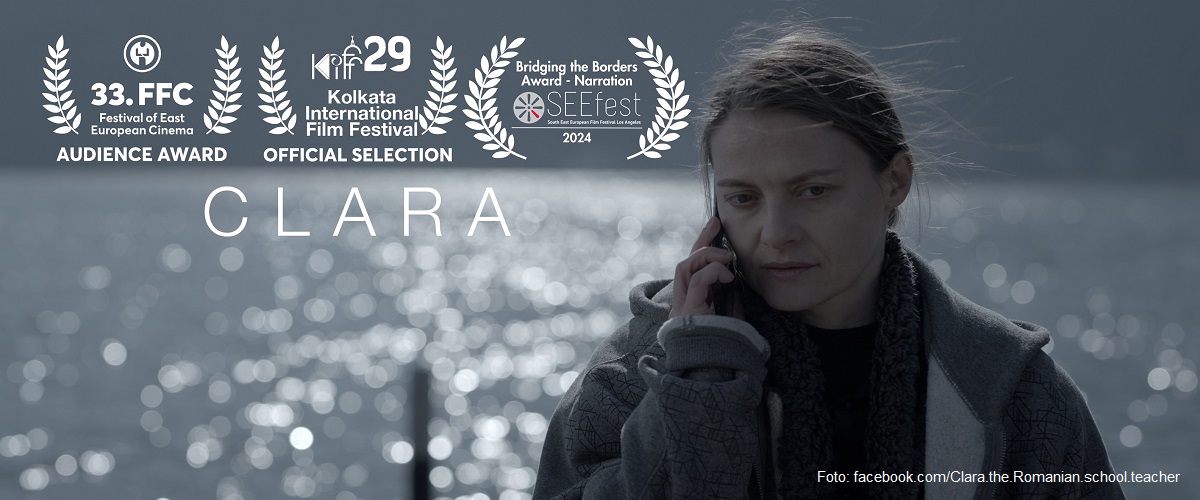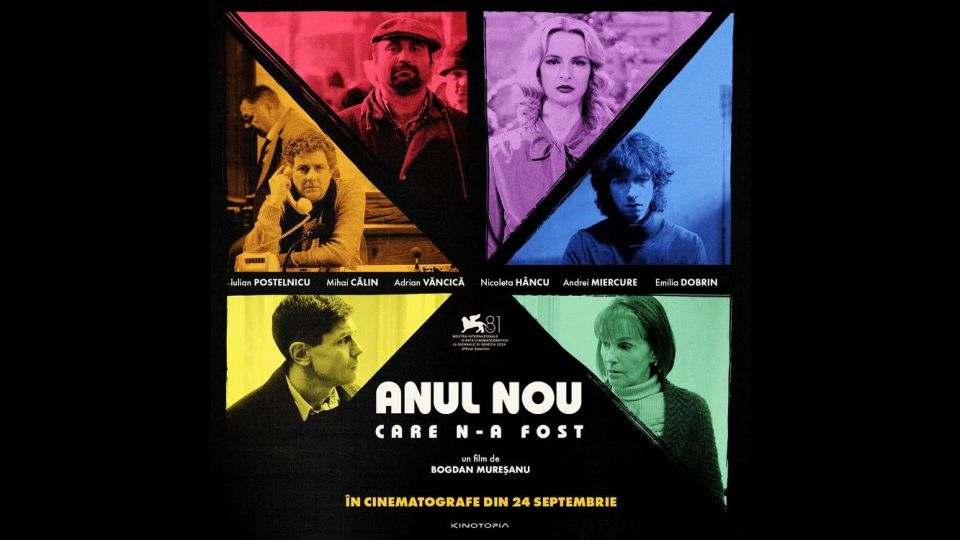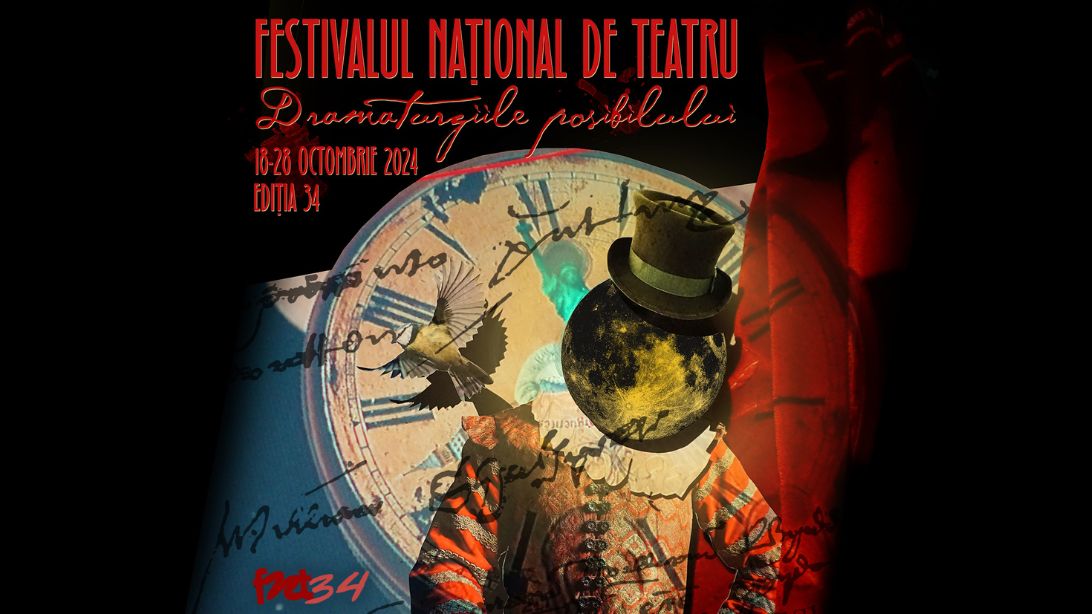Classical studies scholar Andrei Cornea’s most recent novel
A fresh look at Nicolae Ceausescu's communist dictatorship

Monica Chiorpec, 06.07.2019, 14:00
Andrei Cornea is an art historian, an essay writer, a classical studies scholar, a columnist and a philosopher. “Tales from Bibis Age is the title of Andrei Corneas most recent work, a novel brought out by the Humanitas Publishers in Bucharest. The title is a transparent allusion to “1984, one of George Orwells major works, where a world which was in the grip of totalitarianism was lead by the symbolic character known as “Big Brother.
The historian Ioan Stanomir was the host of the launch venued by the upscale Humanitas Cismigiu bookshop in Bucharest.
Ioan Stanomir:
“I should like to begin by saying it is one of the most ambitious books that has been launched recently, were it only for the fact that Andrei Cornea tries to strike up a dialogue with an illustrious tradition, that of the dystopia, thereby imagining a dialogue with one of the 20th century most unsettling books, George Orwells ‘1984’, from the perspective of a troubled sensitive consciousness in the 21st century. It is a troubled and unsettling book, since it is a meditation on peoples ability to adapt, and on peoples inability to perpetuate the cult of the memory and the duty of telling the truth.
It was also historian Ioan Stanomir who said that, although after a first reading, Andrei Corneas text seems to be clearer than ‘1984’, the famous work it strikes up a dialogue with, the novel “Tales from Bibis Age documents a moral degradation as well as a perversion of memory which deepen the feeling of “ontological pessimism. Andrei Corneas recently-launched novel is therefore a useful instrument for todays readers, whether they are or not passionate about intertextuality.
I believe that, as we speak, such a book can be appealing to a readership made up of several layers. It may target those who are passionate about human nature and can discover the reflections of a moderate pessimism to the extent to which human nature is almost irredeemably corrupted by dictatorship. Then they may also find reflections on how dictatorship was reinvented as controlled democracy. And eventually, the book may also target those who look at literature as an addition of echoes of the texts that had been written before it.
Literary critic Cosmin Ciotlos participated in the launch of Andrei Corneas book. Cosmin Ciotlos emphasized the scope of the unprecedented literary endeavor, that of striking up a dialogue with one of the major dystopias of the 20th century.
“Literary speaking, what we have here is one of the most audacious books, one of the boldest, which not only tackles a difficult genre, the dystopian one, but also tackles one of the 20th centurys founding and essential books. And it does that recomposing its entire context, reinventing that context, doing some sort of docu-fiction, which is of the highest quality, even with “George Orwells ‘1984.
In “Tales from Bibis Age, Andrei Cornea takes up on George Orwells character, imagining it as living after the collapse of the totalitarian regime embodied by the “Big Brother. For Cosmin Ciotlos, the behavior of the other characters revolving around that Winston Smith is the unique selling point in Andrei Corneas novel.
The big surprise in this book is provided by a couple of questions anyone of us has no choice other than to ask them, in the long run, once we see what is going on here. One such question is How bad our affective-ideological memory works? How is it that an entire world, having an encounter with this Winston Smith, can take his memoirs for a novel? How is it possible for all people there, save for some unassuming and debatable exceptions, to say that the manuscript he submits to the publisher has an exceptional imagination, a ‘deranged imagination just as some publisher called it, and that such trouvailles will surely sell? These are not trouvailles, it is some sort of reality that man had experienced. As a literary critic, I was baffled by the detail that a bunch of those amnesic characters were so good at reading that. They read the manuscript as if they were literary critics, they like it, they get their kicks out of speculating around it, and are so intelligent doing that, yet they are not fair. The intelligence of speculation does not mean the truth.
Andrei Cornea:
The issue of memory, which is a theme in its own right, here, in my novel, should be taken with a grain of relativity. It is true that the amnesia does exist, of the many people who only reminisce trifles and rather funny things and little worries from the age of the dictatorship, just as so many people do today, I mean those who say it was not so bad in Ceausescus time. I do not want to condemn them, in my novel at least, I let them live as well. The amnesiacs or those who are relatively amnesic have the feeling that Winston Smith, the character I borrowed from Orwell, exaggerates, that he is a radical. Perhaps they are right, in a way. I do not want to be positive about it, as that is the privilege the novel has as compared to the essay. You dont have to decide, but you should let your characters embody different viewpoints. You dont have to be consistent with yourself, all along.
“In the long run, that is the destiny of the word: to turn into action. How great is the responsibility of the author of the words for the acts of future generations? I wouldnt know that for sure. And because I dont know that, I indulge in this petty act of cowardice, which is fiction, where I let things progress almost naturally. From this point onwards, I do not have a solution, Andrei Cornea writes.






























